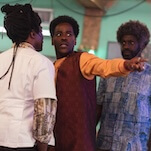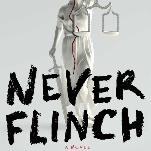One of the perils of being too closely connected with the world of television journalism is that you know a bit too much about how the sausage is made. For example, it became widely known last year that the producers of The Office actually wanted to choose Nellie Bertram, as played by Doctor Who alum Catherine Tate, to be the new boss were it not for a scheduling conflict. It’s not that I was a particular fan of Tate’s work on this show (which was just fine) or her work elsewhere (which I have limited connection to, having been a more recent Doctor Who convert); instead, I would like to be able to consider Tate’s character as a clearly planned reintroduction rather than a slapdash, second option to enable working with a particular actress.
The unfortunate thing about “Tallahassee,” or at least one of the unfortunate things about “Tallahassee,” is that it does little to expand the character beyond her initial appearance last season. By introducing Bertram as the President of Special Projects, thus placing her at the head of the special meetings organized to give Sabre a retail presence, the show quickly puts her into a typical position of power and then just lets her quirks slightly modify that position. Her character doesn’t create any new or specific comic scenarios, instead taking a tried and true Office standard (the meeting or presentation) and putting a slight spin on it by dialing up the character’s neuroses artificially.
There are moments in Bertram’s introduction that I quite liked, primarily the way in which she used Ryan as a forced entry into discussions of sexism. There’s a charm to Tate’s performance in those moments where she is dismissive of Ryan’s size and where you can see her attempt to micromanage her audience. However, those moments grew more sporadic as the episode wore on, to the point where it almost felt like the writers were waking up her character so that she could say something wacky after being otherwise normal. Nellie, at this point in time, isn’t actually a character so much as she’s a robot who will sporadically, on cue, deliver a few bits of wacky characterization. Of course, the show hasn’t bothered to make Cathy any kind of character, so Nellie is fairly engaging if we’re defining Cathy and the other faceless, nameless people witnessing this seminar as the baseline.
I would argue, though, that this baseline is part of the show’s problem right now. From my experience, these kinds of workshops are all about the communities you form and the occasionally annoying people you have to interact with (although, if you’re reading this and have been in a workshop like this with me, I’m sure you were just wonderful to work with). The best parts of this storyline were those where Jim and Florida Stanley just sort of hung out, and I wish we could have seen more of that over the course of the episode. You survive that kind of bullshit team-building exercise by doing things like sneaking rum into your glass—if any of the people who have led workshops I have participated in are reading this, I promise I have never actually done this—or making inside jokes, and focusing on these elements of the meeting would give the Tallahassee setting a sense of community that could be used as a foundation for further comedy. Instead, it ended up feeling like a generic, boring situation that just happened to be punched up by periodic bursts of wackiness, whether from the walking caricature that is Todd Packer, the neuroses of Nellie Bertram, or our old friend Dwight Schrute.
Dwight’s storyline in this episode was ridiculous, and not in a way that I found in the least bit funny. As much as Rainn Wilson is a capable physical comedian, “Tallahassee” suffered from a serious case of diminishing returns: While there was a nice subtlety to his efforts to pull down the screen at the onset of his appendicitis, everything else was just a dull expansion of that joke to its increasingly illogical ends. The joke never changed, and therefore, the joke never got any funnier. While not quite on the level of Deangelo returning to the office as a brain-damaged outpatient, Dwight’s hospital escape still struck me as a cheap punchline, the kind of broadly depicted scenario that requires some sense of meaning beyond the wackiness at its center to be truly successful.
I just don’t see where that meaning is, exactly. Do we really care if Dwight gets made Vice President of a division at Sabre? His motivations have been so vague that I’m really not convinced there’s anything for us to relate to, so the notion of abandoning those efforts and endangering his life for them felt too broad by half. I realize Dwight is not the most rational character in the world, but his irrationality is funnier when it has a purpose that feels unique to the character or to a specific situation. The other space where the writers could create meaning is if we really cared about this presentation, or felt any sense of community that Dwight’s presentation could be interrupting, but the show just rested on its laurels and played it out as yet another “Gosh, isn’t this situation we crafted for you awkward?” situation. When the episode cut to Cathy shaking her head during the presentation, ity might as well have cut to any random member of the audience, and even the more developed series regulars did not feel like specific observers of this event. While the jokes themselves were equally stale, it was the lack of anything beyond the simple setup that robbed the scene, and Dwight’s entire storyline, of any larger impact.
As for everything back in Scranton, this storyline could not have been slighter. Ed Helms had some fun with Andy’s tenure as receptionist, but wouldn’t the office have gotten a temp for that purpose? While the storyline starts with a suggestion that Andy has poorly planned for the other employees' departure, it eventually becomes a silly trifle where Andy discovers his true calling organizing markers and faxing and shredding simultaneously. There were some enjoyable moments, as well as some odd sexism from Darryl that seemed out of character to me, but the logline of “Andy finds his new calling as the temporary secretary” pretty much tells you everything you need to know.
While I left last week’s episode with a sense of hope, “Tallahassee” lived up to none of that potential. However, at the same time, it never put itself in a position to live up to its potential. By so clearly boiling itself down to two extremely basic comic scenarios (Dwight powering through his illness and Andy as secretary), and by doing very little to build out a sense of community or story beyond those scenarios, there just ends up being nothing for us to latch onto and nothing to expand on the momentum offered by the trip to Tallahassee. When the episode ended with a complete non sequitur where Andy chats with a client and soulfully glances at a photo of him and Erin, I was perplexed: Was that entire storyline simply an excuse for Andy to answer that phone call? There was no resonance in that moment because the episode did nothing to build it, content instead to allow wacky comic moments to serve as temporary disruptions from a lifeless status quo that will not successfully sustain the show in the future.
Stray observations:
- So, not only is the show trying to convince us that Sabre is a large enough company to make a push into the retail market, but it’s also convincing us that the Sabre Pyramid remains an actual product on the market? I’m all for the show playing with our own reality, but given that the storyline that brought Sabre into the picture was all about the economic downturn forcing Dunder Mifflin into bankruptcy, it’s an unfortunate left turn.
- The cold open was a bunch of silly sequences paired together, but that’s actually not a bad strategy for the cold open. It’s less successful when you build an episode around it.
- I still really like Florida Stanley, as he’s the one character who felt like he was really present in the various meeting sequences. I wish we could have seen similar characterization for the other characters, although Erin got a few nice bits as well (with the double name tags, for example).
- So, I’ve never had a Famous Amos cookie, but I love that Wally Amos’ Wikipedia page has his signature on it for some reason.
- “I was reading the mattress tag, and I fell asleep.”
- “It’s so peaceful I’ve already written 12 plays already.”
- “It’s just rum — I’m not bored, I’m a pirate!”







































